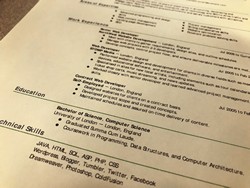It’s not uncommon for students to struggle with building resumes. Creating a resume can cause stress and pressure, since it’s the main determining factor in getting hired for a job. But it doesn’t have to be so difficult. There are simple tips to follow that will ensure a flawless resume.
If you’re beginning from scratch, six basic categories should be included on every resume: contact information, an objective that explains why you want the job, education, experience, skills, and achievements.
First off, a resume should be clear and consistent. Using only one or two font styles and sizes throughout your resume gives it clarity and consistency. This will mark the difference between a weak and a strong resume. If an employer spends too much time figuring out where to find your experience, skills, etc., your resume will simply be tossed to the side.
Another aspect of clarity that many people don’t consider is name size. The most important part of contact information is your name; it must be large and bold to ensure that it’s the first thing the employer sees upon viewing your resume. It’s your brand name, and your resume must wear it well.
Organizing experience and education in reverse chronological order also gives your resume more clarity while highlighting your current experience by placing it on top. Bullet points offer clarity but should not be used excessively; rather, they should highlight the most important parts of your resume.
Another vital aspect of resume building is keeping everything relevant. Although you may have experience with ten different employers, only list the experience that is relevant to the one you’re applying to. List any past experience that has taught transferrable skills, which are skills that can be utilized in any type of job.
Your resume has to let the employer know that you really want that job. In fact, one of the most common mistakes is sending the same resume to every job you apply for. Rather, each resume should be tailored to a specific job, and the objective should reflect why you want that specific job by basing it on the job description.
Students tend to underestimate originality as an important resume feature. Too many people list clichés in their objective by writing about how much of a motivated and hardworking student they are. A great way to steer clear from an unoriginal, blasé resume is to once again include an objective specific to each job that explains why you are the perfect candidate by listing your best job skill.
Listing duties and responsibilities under past experience is another place to display originality and should be the main focus of your resume. “When you’re talking about your experience, you have to make sure that you list what you’ve done in that job, and don’t just say ‘I was a cashier’; put more things about it,” said Mariah Laster, a sophomore psychology student. “Be strong with your skills; don’t just say you’re a leader, but describe your leadership.” When describing your experience, you should be brief yet specific.
A common concern of resume building is a possible lack of experience, but a resume can still be substantial without listing a dozen jobs. The quality over quantity rule greatly applies to resumes.
The organizational structure of a resume can have a great impact as well, and the one you choose should be based on your own experiences. “I don’t have much experience, so I put my skills on top,” said sophomore computer science student Shabbir Khan. “The workshops [Monmouth] has about making your resume have really been helpful; we learned about the different types of resumes; resumes where you put your education on top or on the bottom, and variations of that.”
When your perfect resume comes to life, don’t forget to proofread it carefully; miniscule grammar and spelling mistakes add up and will leave the employer unimpressed with a low chance of hiring you. Your contact information is the most important section that should be proofread, since a typo in your phone number or email address means you will never get contacted for the job.
Don’t be lazy when it comes to building a resume, since a substantial one leads to great opportunities. “When you email your resume, the only thing you have to go on is that piece of paper and its content,” said William Hill, Assistant Dean of Career Services. “It’s the most important thing because if that resume doesn’t sell and promote them in a good way, they’re not going to go any further. The resume is going to be discarded or put on file and they’re never going to hear from that employer again. Everything is weighing on it.”
Whether you’re revamping your resume or starting from scratch, these tips are sure to help you land the job of your dreams.
PHOTO TAKEN by Jenna Puglisi




